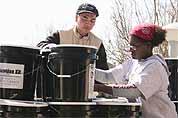Work camps help rebuild Gulf Coast area
UUSC work camps give participants an up-close view of Gulf Coast destruction.
“I just wanted to do whatever little part I could,” Williams said.
On their first day, last Monday, workers got a tour of the city. “It was pretty intense,” said Williams, a college student who is a member of the Tennessee Valley Unitarian Universalist Church and the Unitarian Universalist Association’s Church of the Younger Fellowship. “It’s hard to understand just how huge this situation is and how far residents have to go before recovery. There are so many homes where nothing has been done.”
The workers spent their second day helping a United Methodist church in New Orleans prepare to host hundreds of volunteers who will be coming to the city in the months ahead. They spent another day helping repair a Catholic school, and another helping clean out the First Unitarian Universalist Church of New Orleans, which was heavily damaged by floodwaters.
Williams said she volunteered for the camp for two reasons. Before the hurricane she’d been working with youth in the New Orleans area on nonviolence topics. Second, she’s a friend of Jyphia Christos-Rogers, former president of First Church.
To Jocelyn Smith, a staff attorney for a labor union and a member of the First Unitarian Congregational Society in Brooklyn, New York, the destruction at the New Orleans church was “heartbreaking.”
“We went into rooms that had obviously been decorated and furnished with love and pride,” she said, “and we emptied them out so that the congregation could proceed with an evaluation of the structure. I was glad that we were there to do the work so that the congregants didn’t have to be the ones to pull apart the furniture that meant so much to them and carry it out to the street.”
Smith joined the work camp because of 9/11. “So many people came to New York City to help,” she said. “I wanted to repay the favor.” She said she had expected New Orleans to be farther along in its recovery, adding, “Damaged houses are just sitting there and homeowners do not seem to be getting much help. That’s stunning to me.”
The midweek assessment from the UU Service Committee’s Kim McDonald was that “Things are going great.” McDonald, senior associate for education and action for the independent human rights organization, coordinated the camp along with program associate Nguyen Weeks. “People here are happy to see us,” McDonald said. “Right after the holidays they felt like they’d been forgotten.” McDonald said some people think New Orleaneans are reasonably settled by now, but that’s not the case. “We’re just starting to get into the repair stage now,” she said. “There will be much more to do.”
The camp, which concluded Friday, was one of two JustWorks camps the UUSC is organizing this winter to help the Gulf Coast area more livable. The UUSC has operated more than 40 JustWorks camps across the United States since 1996 as short-term projects that help volunteers examine and understand the root causes and damaging effects of injustice. McDonald said one goal of the New Orleans work camp was for participants to go home and spread the word about the needs they saw in New Orleans.
The second camp will be held March 5 to 11, in Biloxi, Mississippi. At that camp, which will focus on construction, volunteers will work with community-based partners to help returning survivors clean up and repair damaged homes. The East Biloxi Coordination and Relief Center will take the lead in the coordination of repair and reconstruction work projects for the camp. All help is appreciated, but electricians, carpenters, and experienced drywall installers are especially welcome at this camp. The cost is $300 per person and scholarships are available.
Individuals or church groups interested in helping in the Gulf Coast can also contact the Rev. Marilee Baccich, who began work February 1 as the “minister to the community” for the Unitarian Church of Baton Rouge, which is coordinating UU relief work in the area. She can be reached at ucbrmisc@bellsouth.net or (225) 926-2291. Her position is funded through the UUA-UUSC Gulf Coast Relief Fund, which raised more than $3 million last winter for hurricane and flood relief. The fund is also subsidizing the two work camps.








